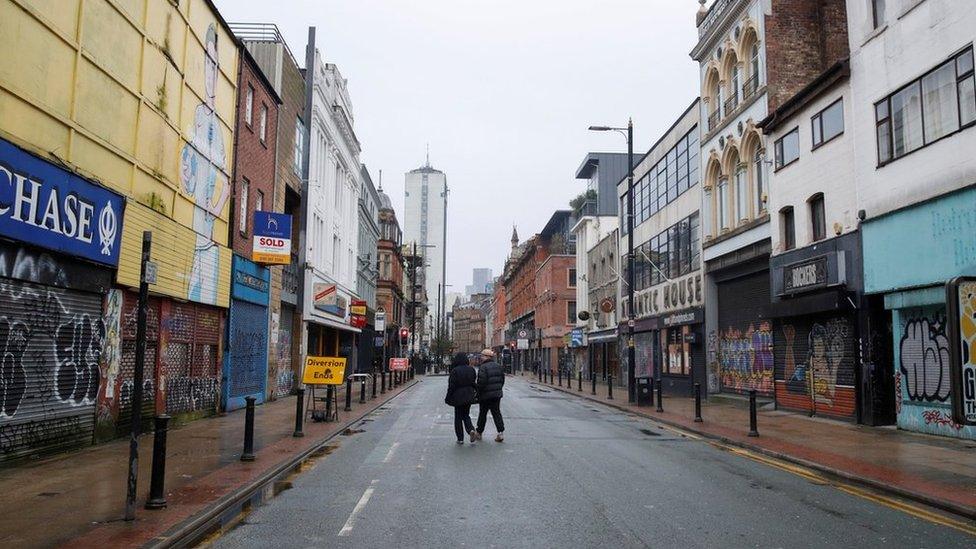Covid: Who are the workers 'excluded' from support?
- Published

Many MPs and campaigners have been putting pressure on the government to provide financial support to millions of UK taxpayers not entitled to special funding schemes during the pandemic.
Who are these workers and why have they been unable to receive this help?
Less than half of earnings from self-employment
Many of those without financial support fall between two schemes.
One of these groups is people who make less than half of their income from self-employment, meaning they are ineligible for the Self-Employment Income Support Scheme (SEISS).
Some will have an employer, which means they could be furloughed under the Coronavirus Job Retention Scheme (CJRS) - and receive financial support that way, but many do not.
The decision on SEISS is made based on their accounts for 2018-19, although if they are ineligible based on that year, Revenue & Customs (HMRC) may also look at the previous two years.
So, for example, if someone worked a part-time job with an employer from 2016 to 2019 while trying to establish their own self-employed business, they might find they are not eligible for any support.
Also, the income making up the more than 50% that would disqualify someone from SEISS does not have to come from just earnings from an employer - it could be rent being paid to a property, income from investments or a pension.
HMRC estimates about 1.4 million self-employed people in the UK did not qualify for SEISS because of the 50% rule.

Moving between jobs
A complicated work history can also make claiming support hard.
And this has been a particular problem for people working in creative industries, who often work a series of short-term contracts with gaps in-between.
A National Audit Office report, external in October quoted estimates from ExcludedUK, which represents people who have been unable to access financial support during the pandemic, about 400,000 short-term contractors moving between jobs had been ineligible for support in the UK.
People who were newly self-employed and so had never submitted a relevant tax return would also have been ineligible for SEISS.
And HMRC estimated that was about 200,000 people.
Company directors
Another example is directors of their own companies who pay themselves through dividends, which is usually the way companies share profits among shareholders, rather than a salary.
Many people with their own businesses find dividends a better way of paying themselves, because they take money from the business only when it has made a profit.
But HMRC does not distinguish between such payments and dividends paid to investors.
The Association of Independent Professionals and the Self-Employed estimates 710,000 limited-company directors in the UK have been receiving little financial support during the pandemic.
Company directors could also be eligible for government-backed loans for their businesses.
But unlike the funding from the other support schemes, that would need to be repaid.
Earning too much
People who had trading profits of more than £50,000 in 2018-19 are ineligible for SEISS, which the Institute for Fiscal Studies (IFS) estimates, external disqualified about 225,000 people.
Kate Bell from trade-union umbrella body the TUC suggested to the Treasury Committee investigation, external into the "excluded", in June, the government might look into whether this could "be applied more on a taper basis" rather than a strict cut-off.
But at the moment, someone earning £49,999 would be eligible for significant support, while someone earning £50,000 would receive nothing.
And that is despite the fact, as the IFS points out, furloughed workers with an income of £50,000 or more can still receive support of £2,500 a month.
Other support
Other groups without financial support include those made redundant during the pandemic instead of being furloughed.
Prime Minister Boris Johnson told MPs: "As long as restrictions are in place, we will continue to support everyone affected by them." saying that people unable to access the government's financial-support schemes could be eligible for universal credit.
But not everybody will be able to claim.
Eligibility depends on factors such as whether a claimant has children, savings or any other income coming into their household, which are not taken into account for the Covid support schemes.
The NAO, Treasury Committee and Public Accounts Committee have all recommended the government finds ways to support people who have lost their income but missed out on funding throughout the pandemic.

A SIMPLE GUIDE: How do I protect myself?
AVOIDING CONTACT: The rules on self-isolation and exercise
WHAT WE DON'T KNOW How to understand the death toll
TESTING: Can I get tested for coronavirus?
LOOK-UP TOOL: Check cases in your area



